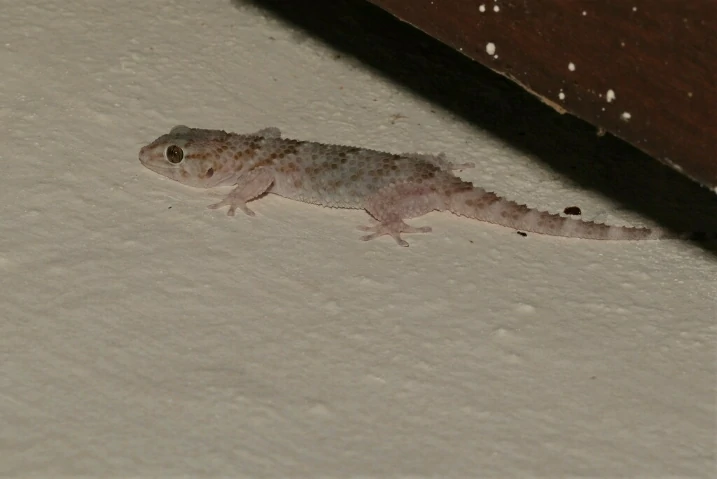If you’ve ever found a gecko in your closet or noticed one crawling around your laundry, you might start to worry about your clothes.
Moths and other insects are known for munching on fabric, so it’s natural to wonder if geckos do the same. Do geckos eat clothes?
No, geckos don’t eat clothes. Geckos eat insects, not fabric or clothing. If you see a gecko near your clothes, it’s probably hunting for bugs hiding in your closet, not looking for a snack on your favorite shirt.
Geckos are carnivores. They need live prey like insects and spiders to survive.
Their bodies are built to digest protein from bugs, not plant fibers or synthetic materials. Your clothes are completely safe around geckos.
What Geckos Actually Eat
Geckos are hunters that feed on small moving prey. In the wild, they mostly eat insects and other tiny creatures.
Most geckos eat moths, crickets, flies, beetles, ants, and spiders. They’re built to catch and eat live insects, not chew on fabric.
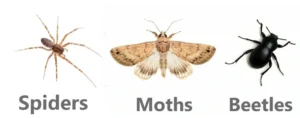
When a gecko sees movement, its hunting instinct kicks in. It watches carefully, creeps closer, and then strikes quickly to catch the bug.
This only works with living prey that moves, not with your clothes hanging in the closet.
Geckos also need the nutrition insects provide. Bugs are full of protein, fat, and other nutrients that geckos need.
Fabric has none of these, so even if a gecko tried to eat your clothes, it would get nothing from it.
Why Geckos Might Be Near Your Clothes
If you see a gecko in your closet or near your laundry, there’s a reason for it, and it has nothing to do with eating fabric.
Geckos go where insects hide. Closets, drawers, and piles of clothes make perfect spots for moths, silverfish, and other bugs. They hunt in dark, enclosed spaces where insects gather.
Your closet is basically a buffet for geckos. Moths love hiding in clothing, especially wool and cotton. If moths are in your closet, geckos will follow them there to hunt.
Geckos also like warm, dark spots to rest during the day. A pile of clothes or a shelf gives them a safe place to hide while they wait for nighttime to hunt.
So if you find a gecko near your clothes, don’t worry about it. Instead, check for the insects it’s hunting.
The gecko is actually helping you by eating pests that could damage your fabric.
Can Geckos Damage Your Clothes?
While geckos won’t eat your clothes, you might wonder if they can damage them in other ways.
The short answer is no. Geckos are small and lightweight with soft feet. They won’t tear, scratch, or stain your clothing just by walking on it.
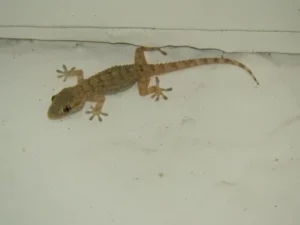
Some people worry about gecko droppings on clothes. Gecko poop is small and usually dry. While it’s not pleasant, it won’t ruin fabric.
You can brush it off or wash the item normally.
Geckos don’t have claws like cats or sharp parts that could snag fabric. Their feet have tiny sticky pads for climbing, but these are soft and won’t harm clothes.
The only time you might need to be careful is with very delicate or expensive items. In that case, store them in sealed containers, not because geckos will hurt them, but to keep everything clean and protected.
What Animals Actually Eats Clothes?
If you see holes or damage in your clothes, geckos aren’t to blame. The real culprits are insects.
Moths are the most common fabric-eating pests. Clothes moths and carpet beetles love natural fibers like wool, silk, cotton, and fur.
It’s the larvae, or baby insects, that actually eat the fabric to get protein from animal fibers.
Silverfish are another pest that can damage clothes. They eat starches and sugars in fabric, especially cotton and linen. You might see small holes or yellow stains where they’ve been.
Carpet beetles also feed on natural fibers. Their larvae are tiny and fuzzy, and they can seriously damage wool carpets, blankets, and clothing if left alone.
So if a gecko is in your closet, it’s actually good news. Geckos eat all of these fabric-damaging insects. A gecko is like a natural pest control service that works for free.
How Geckos Help Protect Your Clothes
Having geckos around your clothes is actually helpful, not harmful.
Geckos hunt and eat the insects that would otherwise damage fabric. A single gecko can eat dozens of insects per night, including moths and beetles.
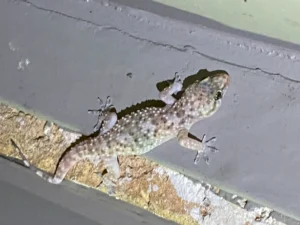
If moths are a problem in your closet, a gecko can help control them. Geckos are especially good at catching moths at night, which is when moths are most active.
Geckos also eat silverfish, another pest that can damage books, papers, and fabric. By keeping silverfish numbers down, geckos protect more than just your clothes.
In many tropical countries, people welcome geckos into their homes for this reason. The geckos keep insects under control, which means fewer pests bothering people and damaging belongings.
Should You Remove Geckos From Your Closet?
If you find a gecko in your closet, you don’t need to panic or rush to remove it.
Geckos are harmless to you and your belongings. They’re quiet, clean, and helpful. Most people who have geckos in their homes get used to them and even appreciate having them around.
If you really don’t want geckos in your closet, you can gently move them outside. Just catch the gecko carefully with your hands or a container and release it in your garden or near your home where it can hunt insects.
But if you remove the gecko without dealing with the insects, you’ll still have a pest problem. The gecko was there because it had food. To keep geckos out of your closet long-term, you need to get rid of the insects first.
How to Keep Both Geckos and Insects Out of Your Closet
If you want a closet free of geckos and insects, there are simple steps you can take.
First, clean your closet regularly. Vacuum floors and shelves to remove insect eggs, larvae, and debris. Bugs like dust and dark corners, so keeping things clean makes your closet less attractive to them.
Store clothes properly. Use sealed containers or garment bags for items you don’t wear often, especially wool and silk. This keeps insects away and makes your closet less interesting to geckos.
Use natural insect repellents like cedar blocks or lavender sachets. These smells keep moths and other fabric-eating bugs away. When the insects leave, the geckos will follow because there’s nothing left to hunt.
Fix any cracks or gaps around windows and doors where insects and geckos might enter. Better sealing keeps both outside where they belong.
Keep your closet dry. Insects love moisture, and geckos like humid spots. Use a dehumidifier if needed, and make sure there are no leaks or damp spots.
Are Geckos Attracted to Dirty Clothes?
Geckos aren’t drawn to dirty clothes themselves, but dirty laundry can bring them closer indirectly.
Dirty clothes, especially with food stains or sweat, attract insects. Flies, ants, and other bugs are drawn to the smell. And where there are insects, geckos follow.
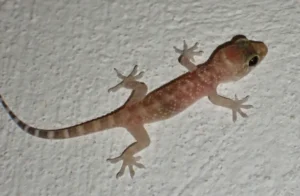
So if you have a pile of dirty laundry sitting around, it might attract bugs, which attracts geckos. The fix is simple: don’t leave dirty clothes lying around.
Use a hamper with a lid and wash laundry regularly. This keeps insects away, so geckos won’t have a reason to check out your laundry pile.
Clean clothes don’t attract geckos. If your closet is full of freshly washed, properly stored clothing, geckos won’t be interested unless there are insects hiding there.
Conclusion
Geckos do not eat clothes. They hunt insects, not fabric, and your wardrobe is completely safe around them.
If you find a gecko in your closet, it’s there to eat the insects that could actually damage your clothes. Moths, silverfish, and carpet beetles are the real threats, and geckos help control them naturally.
Instead of worrying about geckos, focus on keeping insects out. Clean regularly, store clothes properly, and use natural repellents. When the insects are gone, geckos will move on to find food elsewhere.
Having a gecko near your clothes is actually a sign you might have an insect problem. The gecko is helping you by eating the pests. Next time you see one in your closet, you might even want to thank it instead of
Hi, my name is Ezra Mushala, i have been interested animals all my life. I am the main author and editor here at snakeinformer.com.

